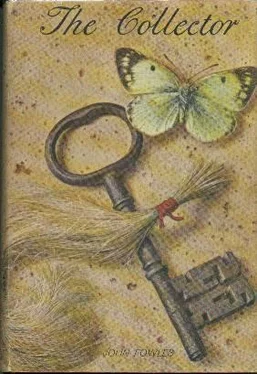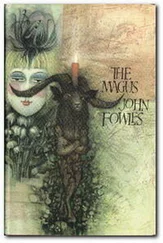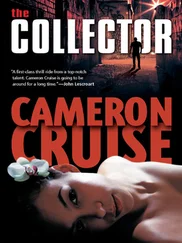M. So your aunt took you over.
C. Yes.
M. Like Mrs. Joe and Pip.
C. Who?
M. Never mind.
C. She’s all right. She kept me out of the orphanage.
M. And your cousin Mabel. You’ve never said anything about her.
C. She’s older than me. Thirty. There’s her older brother, he went out to Australia after the war to my Uncle Steve. He’s a real Australian. Been out there years. I never seen him.
M. And haven’t you any other family?
C. There’s relations of Uncle Dick. But they and Aunt Annie never got on.
M. You haven’t said what Mabel’s like.
C. She’s deformed. Spastic. Real sharp. Always wants to know everything you’ve done.
M. She can’t walk?
C. About the house. We had to take her out in a chair.
M. Perhaps I’ve seen her.
C. You haven’t missed much.
M. Aren’t you sorry for her?
C. It’s like you have to be sorry for her all the time. It’s Aunt Annie’s fault.
M. Go on.
C. She like makes everything round her deformed too. I can’t explain. Like nobody else had any right to be normal. I mean she doesn’t complain outright. It’s just looks she gives, and you have to be dead careful. Suppose, well, I say not thinking one evening, I nearly missed the bus this morning, I had to run like billy-o, sure as fate Aunt Annie would say, think yourself lucky you can run. Mabel wouldn’t say anything. She’d just look.
M. How vile!
C. You had to think very careful about what you said.
M. Carefully.
C. I mean carefully.
M. Why didn’t you run away? Live in digs?
C. I used to think about it.
M. Because they were two women on their own. You were being a gent.
C. Being a charley, more like it. ( Pathetic, his attempts at being a cynic .)
M. And now they’re in Australia making your other relations miserable.
C. I suppose so.
M. Do they write letters?
C. Yes. Not Mabel.
M. Would you read one to me one day?
C. What for?
M. I’d be interested.
C. ( great inner struggle ) I got one this morning. I’ve got it on me. ( A lot of argy-bargy, but in the end he took the letter from out of his pocket .) They’re stupid.
M. Never mind. Read it out. All of it.
He sat by the door, and I knitted, knitted, knitted—I can’t remember the letter word for word, but it was something like this: Dear Fred (that’s the name she calls me by, he said, she doesn’t like Ferdinand—red with embarrass-ment). Very pleased to have yours and as I said in my last it’s your money, God has been very kind to you and you mustn’t fly up in the face of his kindness and I wish you had not taken this step, your Uncle Steve says property’s more trouble than it’s worth. I notice you don’t answer my question about the woman to clean. I know what men are and just remember what they say cleanliness is next to godliness. I have no right and you have been very generous, Fred, Uncle Steve and the boys and Gertie can’t understand why you didn’t come here with us, Gert only said this morning that you ought to be here, your place is with us, but don’t think I am not grateful. I hope the Lord will forgive me but this has been a great experience and you wouldn’t know Mabel, she is brown in the sun here, it is very nice, but I don’t like the dust. Everything gets dirty and they live in a different way to what we do at home, they speak English more like Americans (even Uncle Steve) than us. I shan’t be sorry to get home to Blackstone Rd, it worries me to think of the damp and the dirt, I hope you did what I said and aired all the rooms and linen like I said and got a good cleaning woman in like I said the same as with you, I hope.
Fred I am worried with all that money you won’t lose your head, there are a lot of clever dishonest people (she means women, he said) about these days, I brought you up as well as I could and if you do wrong it’s the same as if I did. I shan’t show this to Mabel she says you don’t like it. I know you are over age (over 21, she means, he said) but I worry about you because of all that happened (she means me being an orphan, he said).
We liked Melbourne, it is a big town. Next week we are going to Brisbane to stay with Bob again and his wife. She wrote a nice letter. They will meet us at the station. Uncle Steve, Gert and the children send their love. So does Mabel and your everloving.
Then she says I needn’t worry about money, it’s lasting very well. Then she hopes I got a woman who will work, she says the young ones don’t clean proper nowadays.
( There was a long silence then .)
M. Do you think it’s a nice letter?
C. She always writes like that.
M. It makes me want to be sick.
C. She never had any real education.
M. It’s not the English . It’s her nasty mind.
C. She took me in.
M. She certainly did. She took you in, and she’s gone on taking you in. She’s made an absolute fool out of you.
C. Thank you very much.
M. Well, she has!
C. Oh, you’re right. As per usual.
M. Don’t say that! ( I put down my knitting and closed my eyes .)
C. She never bossed me about half as much as you do.
M. I don’t boss you. I try to teach you.
C. You teach me to despise her and think like you, and soon you’ll leave me and I’ll have no one at all.
M. Now you’re pitying yourself.
C. It’s the one thing you don’t understand. You only got to walk into a room, people like you, and you can talk with anyone, you understand things, but when . . .
M. Do shut up. You’re ugly enough without starting to whine.
I picked up my knitting and put it away. When I looked round he was standing there with his mouth open, trying to say something. And I knew I’d hurt him, I know he deserves to be hurt, but there it is. I’ve hurt him. He looked so glum. And I remembered he’d let me go out in the garden. I felt mean.
I went to him and said I was sorry and held out my hand, but he wouldn’t take it. It was queer, he really had a sort of dignity, he was really hurt (perhaps that was it) and showing it. So I took his arm and made him sit down again, and I said, I’m going to tell you a fairy story.
Once upon a time (I said, and he stared bitterly bitterly at the floor) there was a very ugly monster who captured a princess and put her in a dungeon in his castle. Every evening he made her sit with him and ordered her to say to him, “You are very handsome, my lord,” And every evening she said, “You are very ugly, you monster.” And then the monster looked very hurt and sad and stared at the floor. So one evening the princess said, “If you do this thing and that thing you might be handsome,” but the monster said, “I can’t, I can’t.” The princess said, “Try, try.” But the monster said, “I can’t, I can’t.” Every evening it was the same. He asked her to lie, and she wouldn’t. So the princess began to think that he really enjoyed being a monster and very ugly. Then one day she saw he was crying when she’d told him, for the fiftieth time, that he was ugly. So she said, “You can become very handsome if you do just one thing. Will you do it?” Yes, he said, at last, he would try to do it. So she said, then set me free. And he set her free. And suddenly, he wasn’t ugly any more, he was a prince who had been bewitched. And he followed the princess out of the castle. And they both lived happily ever afterwards.
I knew it was silly as I was saying it. Fey. He didn’t speak, he kept staring down.
I said, now it’s your turn to tell a fairy story.
He just said, I love you.
And yes, he had more dignity than I did then and I felt small, mean. Always sneering at him, jabbing him, hating him and showing it. It was funny, we sat in silence facing each other and I had a feeling I’ve had once or twice before, of the most peculiar closeness to him—not love or attraction or sympathy in any way. But linked destiny. Like being shipwrecked on an island—a raft—together. In every way not wanting to be together. But together.
Читать дальше












